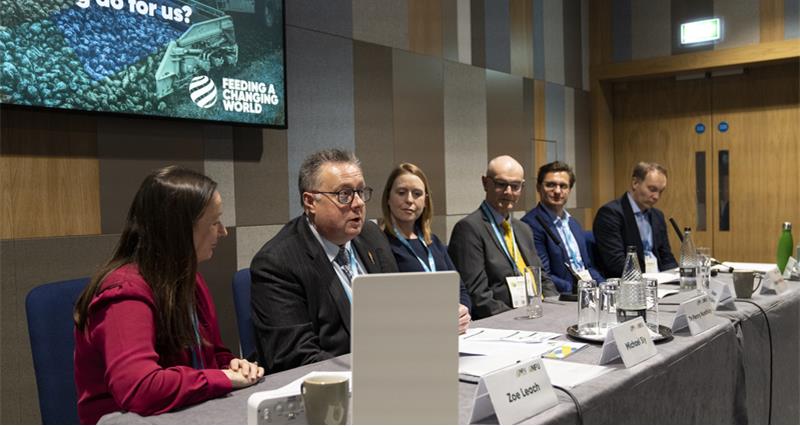NFU Sugar Board Chair Michael Sly said the technologies should be viewed with optimism, after a year in which a catalogue of extreme weather was capped by the emergence of beet moth.
East Anglia Regional Director Zoe Leach reiterated the timeliness of the Bill, while Dr Penny Hundleby, of the John Innes Centre, underlined the similarities between GE and traditional breeding techniques – and the differences.
Both produce traits that could have occurred naturally, she stressed – unlike ‘GM’ which results in DNA being moved from other species – but GE can do this much quicker than traditional breeding.
Speeding the pipeline
“With some of the challenges we are facing, opportunities to speed up the pipeline would be desirable,” she said.
“GE allows us to go in and make exactly the changes we want.”
“GE can do in a matter of months what might otherwise take many years.”
Dr Penny Hundleby, Senior Scientist, John Innes Centre
Professor Mark Stevens, Head of Science at the BBRO (British Beet Research Organisation) weighed up potential targets for GE in beet, with nutrient-use efficiency, beet sweetness and structure for processing, climate resilience, bolting and flowering susceptibility, root rots and seedling disease resistance all areas of interest.
Then, of course, there was virus yellows. While traditional breeding had a good record in beet, he said some challenges, virus yellows included, were likely to prove more difficult.
“The ability to use gene editing in the future is potentially a way of solving them in a different way,” he suggested.
The forthcoming legislation and wider acceptance would be key, he added, noting that, using GM techniques that are prohibited here, he “had solved” both virus yellows and beet mould yellowing virus some 23 years ago.
Prof. Stevens said that one route to tackle virus yellows using GE might be to combine further information about aphid genomes alongside the sugar beet genome, mapped in 2013.
“It’s knowing which genes to edit,” he noted.
Capacity, but a caveat
Stefan Meldau, R&D Lead in Biotic Stress at KWS, outlined the commercial realities of GE for seed breeders in the UK and EU.
He said KWS had “immediate capacity” to implement GE methods once a legislative framework was in place. However, his optimism was mixed with pragmatism and EU legislation was a factor. The necessary food and feed derogation to allow exports of goods using UK sugar produced using GE as an ingredient could take six years and cost €10-15 million, he said, which had implications for the business case.
British Sugar’s Daniel Green joined a panel discussion that offered reassurances on the safety of GE and urged delegates to become advocates for the technology to help foster a positive public outlook.
The panel considered how GE might help to deliver the ambition of a net zero sector by 2040 and Mr Green gave attendees a first look at GE research already being undertaken at British Sugar, in partnership with Tropic Biosciences, with virus yellows the “first target”.
Meet the speakers from this session
Dr Zoe Leach OBE
NFU East Regional Director
Zoe’s passion is to ensure that members are properly represented and supported by the NFU, and in turn that they understand the significant benefits that being a member of such an incredible organisation brings.
Prior to joining the NFU, she worked for the National Pig Association from 2008 to 2022. She took on the role of Chief Executive Officer in 2014 and led the organisation through some very turbulent times.
This followed five years working in the Livestock Science Unit within Defra where she managed the research and development portfolio on livestock production.
Previous to that she ran a large pig rearing unit and trials facility for the integrated pig production company BQP in Suffolk. She gained a PhD in outdoor sow management and welfare with Cambac JMR Research in 1998.
Zoe has been awarded the OBE in the first King’s Birthday honours list. She was granted the honour in recognition of her services to the pig industry.


